What connects a century of work at the Max Planck Institute for Comparative Public Law and International Law? For Armin von Bogdandy, one “red thread” runs through its history: Germany’s two lost world wars and the ways legal scholars grappled with their consequences.
Starting from a striking 1989 triptych of the day after the Berlin Wall fell, von Bogdandy traces the Institute’s journey from its 1924 founding in the shadow of Versailles, through the moral compromises of the Nazi period, to post‑war reconstruction and European integration. Debates over German division, Ostpolitik and constitutionalism emerge as different responses to defeat and its ramifications.
As institutional memory fades—over half the staff are under 35—von Bogdandy questions whether an institution can still claim a single identity. Its strength, he argues, lies less in a shared narrative than in productive disagreement about past and future.
In conversation with historian Philipp Glahé, von Bogdandy recasts MPIL’s history as an ongoing dialogue between law, politics and memory—held together by a contested yet inescapable red thread.
About Armin von Bogdandy
Armin von Bogdandy is director at the Max Planck Institute for Comparative Public Law and International Law in Heidelberg, pairing rigorous theory with engagement in constitutional and rule‑of‑law crises. He helped coin influential frameworks — “international public authority,” analysing how actors like the OECD shape national policy through information, and “transformative constitutionalism,” advancing regional human rights–driven change in Latin America. He has contributed legal analyses and proposals that inform EU debates on democratic backsliding. A recipient of multiple honorary doctorates, he exemplifies the scholar‑practitioner: multilingual, philosophically trained, and comparative in outlook. His work insists that law’s deepest questions transcend borders — and that answering them demands both conceptual ambition and institutional craftsmanship.


